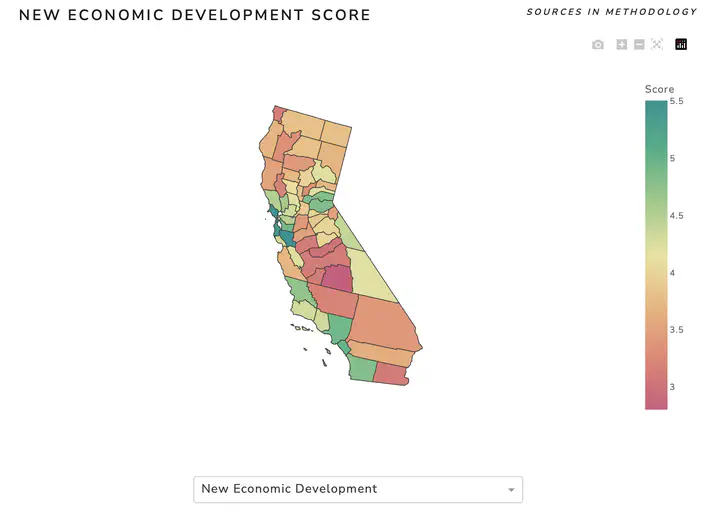New Economic Development Dashboard
An interactive tool from the Oikos workstream

Abstract
What does local economic development look like when considering household needs and the ecosystem around them rather than traditional metrics? Enter the New Economic Development (NED) Dashboard, an interdisciplinary quantitative assessment tool for researchers and local policymakers to explore economic development status geographically along dimensions that better represent the channels for equitable, durable development. The NED framework learns from frontier economic research and combines qualitative findings from agencies involved in local development to represent the characteristics of inclusive economies as well as the needs of communities to successfully tap into prosperity. By compiling and representing key tenets into a barometer, the NED Dashboard quantitatively measures the ecosystem that enables inclusive, sustainable, and resilient prosperity.
The NED approach is informed by two main sources:
Recent research shows the determinant role of social networks, geography, education, and wealth (among others) for enabling local economic development.
Community-based organizations, workforce boards, and community colleges elevate the complementary and equally fundamental role of access, basic needs, and community engagement, particularly for inclusion.
By combining frontier interdisciplinary research with key field-derived learning, three distinct Pillars emerged as comprising the drivers of inclusive local economic development. These are Place-based Conditions, Human and Social Capital, and Economic Activity.
Place-based Conditions refer to the physical foundation upon which people live. Health, environment, and access are factored along with other metrics of thriving communities.
Human and Social Capital cover the enablers of development given by individual education to social affiliation. This includes training pipelines and the strength of networks.
Economic Activity represents material and financial prosperity, potential, and resilience. This is the ‘size of the local economic pie’ and how its ‘slices’ are distributed.
In NED, the three Pillars are not mutually exclusive. High Economic Activity scores do not make up for low Place-based Conditions and/or Human and Social Capital scores (which might imply exogenous economic growth and lacking endogenous assets and ecosystem, and thus unequal opportunity). As such, NED is a barometer of the three Pillars where some degree of equilibrium leads to inclusive, sustainable prosperity. Economic development strategies can thus be tailored by viewing the three Pillars together.
The general categories that cover inclusive economic prosperity and well-being follow:
Basic Needs – to assess environmental, physical, and food health, security, housing, and transport.
Access – to assess access to financial institutions and insurance, and broadband.
Education and Talent – to assess educational attainment, schooling outcomes, and opportunity youth.
Social Capital – to access social networks and cohesion.
Growth and Prosperity – to assess the size and standard of living of local economies, alongside productivity.
Labor Market – to assess jobs, employment, participation, and earnings.
Household Income – to assess household budgets, poverty, financial assistance, and income inequality.
Household Wealth – to assess home and asset ownership, banking availability, and financial resilience.
Business Environment – to assess entrepreneurial outcomes and opportunities.
These are populated from a variety of datasources and indicators that capture their intricacies as well as distributional elements.